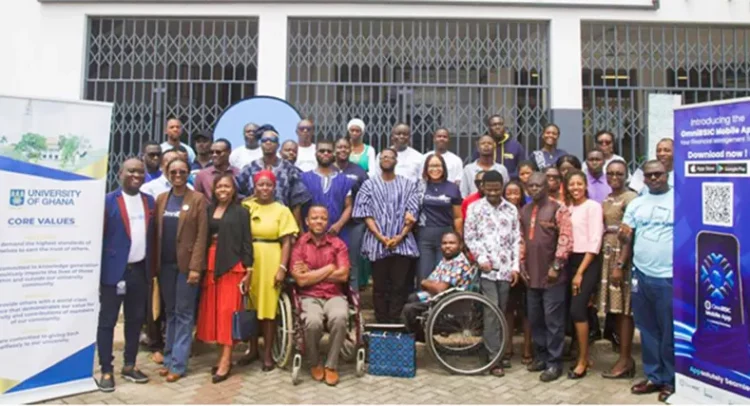Staff of OmniBSIC Bank with the participants
OmniBSIC Bank Ghana LTD has taken a bold step toward redefining financial inclusion in the country with the introduction of its Braille-Assisted Services for visually impaired customers.
This initiative, unveiled as part of the Bank’s Limitless Banking strategy, demonstrates OmniBSIC’s vision to make banking accessible, connected, and empowering for all, irrespective of physical ability or background.
The Braille-Assisted Services are designed to enable visually impaired customers to conduct transactions independently, securely, and with dignity
According to the Ghana Statistical Service, about 4 percent of Ghanaians, over 1.2 million people, live with some form of visual impairment. Many rely on friends or relatives for assistance in reading documents or navigating banking halls, a dependency that often undermines privacy and confidence. OmniBSIC’s new service changes that narrative, allowing customers to open accounts, read information, and make decisions autonomously.
Daniel Asiedu, Managing Director and Chief Executive Officer of OmniBSIC Bank, described the initiative as a powerful reflection of the Bank’s ethos.
“At OmniBSIC, we believe banking should be for everyone, everywhere. Our Braille-Assisted Services are not just a technological addition; they are a statement of our belief that accessibility is a right, not a privilege,” he said.
Furthermore, he added that the bank seeks to extend banking services to all persons with disabilities not just the visually impaired.
With this in mind, the Bank, during the 2025 Global Customer Service Week under the theme ‘Mission: Possible’ engaged students of the University of Ghana at the Assistive Technology Lab under the auspices of University of Ghana’s Institutional Advancement Directorate, Information Technology Directorate, as well as the Centre for Disability Studies and Advocacy(CEDSA).
The engagement marked a significant moment in OmniBSIC’s financial inclusion and accessibility journey, as the Bank seeks to deepen collaboration with academia and advocates in shaping inclusive financial solutions.
At the event, Mrs. Chidinma Braye-Yankee, Group Head of Corporate and Support Services reaffirmed OmniBSIC’s stance that inclusion is a mission requiring empathy, innovation, and strategic partnerships.
“As a bank, we are not just investing in technology, we are investing in people. Through initiatives like this, we are building a system where no one is left behind, and every customer can transact independently and with confidence,” Mrs. Braye-Yankee noted.
OmniBSIC Bank Executive Management officials present at the event, reiterated that such innovations align with the Bank’s digital transformation agenda, which integrates accessibility across platforms.
Engineer Francis Kwabena Boakye, Chief Information Technology Officer-(CITO) of the University’s Information Technology Directorate, praised the visit as the first of its kind by a financial institution. “This collaboration connects the ideals of academic innovation with real-world impact. Through this shared effort, we can ensure that technology truly empowers all,” he said.
A key point of the event was a presentation by Mr. Alexander Bankole Williams, Head of Assistive ICT Lab, who spoke on ‘The Future of Banking: Enhancing Access for Persons with Disabilities in Ghana’.
Drawing on his 25 years of advocacy and personal experience as a visually impaired professional, Mr. Williams stated that financial inclusion for persons with disabilities is not a matter of charity but a right. Citing the Persons with Disability Act, 2006 (Act 715), he stressed that all public goods and services must be made accessible to everyone. “Accessibility is not optional, it is a legal and moral imperative,” he said, urging other institutions to emulate OmniBSIC’s example.
Professor Joana Salifu Yendork, Director of the Centre for Disability Studies and Advocacy (CEDSA), encouraged customer-facing institutions to adopt a “total inclusivity approach,” one that ensures equal access and respect for all persons, regardless of the perceived severity of their disabilities.
During the Q & A session, the Bank announced that it had commenced the braille assistive services, as well as staff training on visual impairment awareness and will extend sensitisation programmes across its 40-branch network to strengthen service delivery for customers with special needs.
A Business Desk Report


